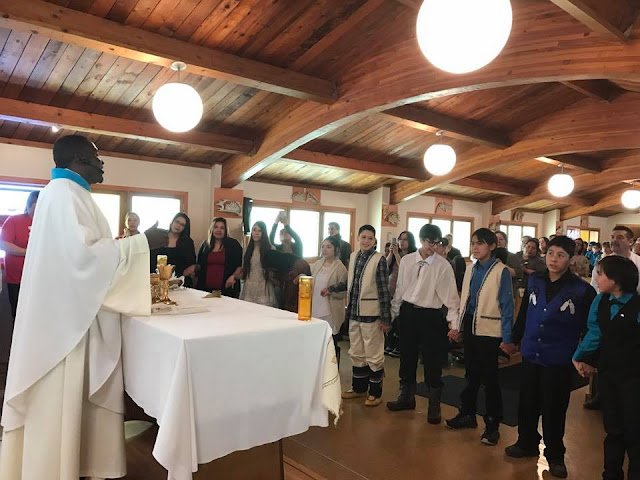By Bayor Chantal Ngoltoingar
OMI JPIC 2016-17 Volunteer
International Women's Day
(IWD), originally called International Working Women's Day is
celebrated on March 8 every year. Different
regions of the world mark the day in various ways but the general focus of celebrations
is to show women respect, appreciation and love for their economic, political
and social achievements.
The former Secretary-General of the United
Nations, Mr. Ban Ki-moon stressed that “violence against women and girls
is a violation of human rights, a public health pandemic and a major obstacle
to sustainable development. It imposes exorbitant costs upon families, communities
and economies. The world can't afford to pay this price. The cost of violence
would represent 5.2% of the world economy.”
Women occupy a
special place in the heart of Pope Francis. In a 2016 Twitter post he noted,
“So many women are overwhelmed with the burdens of life and the drama of
violence! The Lord wants them to be free and their dignity respected.” The pope
has also condemned “the serious practice of female genital mutilation in some
cultures, but also the inequality of access to dignified workplaces and the
places where decisions are made.” The Pope denounces both “abuses in the family
circle” but also “the various forms of slavery, which do not constitute a
demonstration of masculine force but a cowardly degradation.” On the essential
role of women in society and in the church he declared: “Woman is the most
beautiful thing God has created.”
Pope Francis has
repeatedly stressed the “special abilities” of women and the way they look at
the world. “They convey to us the ability to see beyond,” the Holy Father said,
“to understand the world with different eyes, to hear, to see things with a
more creative, patient, tender heart seeking to build a more humane and
welcoming society.” The Pope also invites us to pray that “in
all countries of the world women are honored and respected, and that their
irreplaceable social contribution be valued.”
In the book of
Genesis 2:18, we read, “And the Lord God said, It is not good that the man
should be alone; I will make him an help mate. 21 And the Lord God caused a
deep sleep to fall upon Adam, and he slept: and he took one of his ribs, and
closed up the flesh instead thereof; 22 And the rib, which the Lord God had
taken from man, made he a woman, and brought her unto the man. 23 And Adam
said, This is now bone of my bones, and flesh of my flesh: she shall be called
Woman, because she was taken out of Man”.
God therefore
created woman for man so that they may love one another, and become one flesh,
and to grow, multiply and fill the land with children.
To create the
first humans, He made them himself. To procreate God in his love and his
sovereignty entrusted the unique role of child bearing to the woman.
In Genesis 3, we
see, sin entering the heart of woman and into the heart of man. Because of
this, both have fallen into sin and into death. But the Lord is powerful in his
ability to restore that which has been destroyed. The plan of salvation came
through the Lord Jesus Christ who was born of a woman, a virgin, and born by
the power of the Holy Spirit in the body of a woman. He was formed in the body
of Mary in a supernatural way by the Holy Spirit, so that the posterity of the
woman would crush the serpent's head. It was the woman Eve, who brought sin
into the world, and it was through the woman, Mary, that the world received salvation
through her Son the Lord Jesus Christ.
Bayor comes from Chad, Central Africa and is working
on her Masters in social work at the Catholic University of America. She
recently published a book about the practice of Female Genital Mutilation in
Africa called ” L’obscurite sous le Soleil” translated as “Darkness under the
sun.” The book is currently being translated into English.











